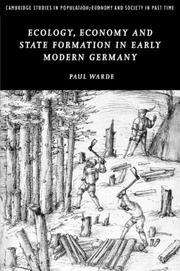| Listing 1 - 1 of 1 |
Sort by
|

ISBN: 9780521831925 052183192X 9780511497230 9780521143332 0511225539 9780511225536 9780511226106 0511226101 0511224214 9780511224218 0511224885 9780511224881 0511497237 9786610541355 6610541353 1107160685 9781107160682 1280541350 9781280541353 0511317948 9780511317941 0521143330 Year: 2006 Volume: no. 41 Publisher: Cambridge : Cambridge University Press,
Abstract | Keywords | Export | Availability | Bookmark
 Loading...
Loading...Choose an application
- Reference Manager
- EndNote
- RefWorks (Direct export to RefWorks)
This is an innovative analysis of the agrarian world and growth of government in early modern Germany through the medium of pre-industrial society's most basic material resource, wood. Paul Warde offers a regional study of south-west Germany from the late fifteenth to the early eighteenth century, demonstrating the stability of the economy and social structure through periods of demographic pressure, warfare and epidemic. He casts light on the nature of 'wood shortages' and societal response to environmental challenge, and shows how institutional responses largely based on preventing local conflict were poor at adapting to optimise the management of resources. Warde further argues for the inadequacy of models that oppose the 'market' to a 'natural economy' in understanding economic behaviour. This is a major contribution to debates about the sustainability of peasant society in early modern Europe, and to the growth of ecological approaches to history and historical geography.
Lumber trade --- Bois --- History. --- Commerce --- Histoire --- Germany --- Allemagne --- Economic conditions. --- History --- Historical geography --- Conditions économiques --- Géographie historique --- History of Germany and Austria --- anno 1500-1799 --- Economic conditions --- Historical geography. --- Lumber industry --- Timber industry --- Forest products industry --- Lumbering --- Arts and Humanities --- Lumber trade - Germany - History --- Germany - Economic conditions
| Listing 1 - 1 of 1 |
Sort by
|

 Search
Search Feedback
Feedback About
About Help
Help News
News